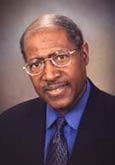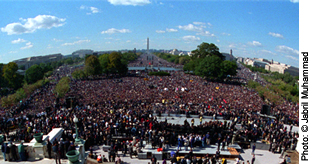By Ron Walters
-Guest Columnist-

I believe that Brother Minister Louis Farrakhan is right when, looking at the upcoming 10th Anniversary of the Million Man MarchTM, he said: “God has called us to do something great.”
I believe that the tremendous legacy set by the appearance of two million Brothers on the Mall in Washington, D.C. on October 16, 1995 should evolve. Ten years later, we should be focused on building upon that legacy with the substance, especially the economic substance, that it will take to make the vision of healing and forward movement a reality.
My view is that, one million or two million Brothers should commemorate this event by their contribution of $100 to a freedom fund, such as the Black United Fund or some new organization. That would raise $100 million to begin the process of self-development and self-healing at a mass level.

We don’t all have to come to Washington, to do that; there could be a symbolic commemoration in Washington, but a more fundamental, local day of contributions by Blacks to those issues that are crying out for financial support. And even if a person doesn’t have $100, they can give whatever they have. When I say everyone, I mean everyone: drug pushers, welfare moms, working poor, blue collar, white collar or no collar. This should not be a “bougie” thing; it should be a community thing.
After reading Brother Randall Robinson’s book, “The Reckoning: What Blacks Owe To Each Other,” I feel even stronger about this. He wrote this book after his hit, “The Debt,” in which he charged that America still owes a debt to Black people for our having helped to build this country. But “The Reckoning” implies that the process of reparation really begins with us and the respect that we have for one another.
So, we can begin the process of reparation more successfully, I believe, by making a demand that America cannot ignore. We could throw down a gauntlet that, at the same time, both challenges America to remember our contributions while enriching our legacy and future.
This “Million Man MarchTM” can benefit Black banks that can hold and grow our funds in a safe and secure environment for at least one year, while a planning committee begins the sacred work of building some steps to the next plateau for our progress. Remember what Ossie Davis said: “It’s not the man, it’s the plan; it’s not the rap, it’s the map.”
Some of the proceeds should be invested in a think tank that begins the process of working through our problems and how we can solve—or contribute to the solution of–many of them. In this, we might marshal the talents of Black institutions we already have, such as: The Patterson Institute of the United Negro College Fund, the Joint Center for Political and Economic Studies, or a new research consortium of Black colleges and universities. Their unique focus would be on solutions—on a plan of attack in each of the critical areas necessary to our survival and progress.
Obviously, an overarching organization or mechanism needs to be created that would look like a small Congress, with representation from all of the segments of the Black community. However, to avoid fractiousness and downright foolishness, it would have a streamlined decision-making capacity, comprised of people who are widely regarded for their integrity and skill at moving projects.
These are just a few thoughts about how the Million Man MarchTM might be commemorated. It would not be so much a commemoration, but a new beginning based on the legacy that exists. We owe this new phase to the spirit of the October 16, 1995 March, we owe it to our ancestors and we owe it to our future and to those unborn.
(Ron Walters is the Distinguished Leadership Scholar, director of the African American Leadership Institute in the Academy of Leadership and professor of Government and Politics at the University of Maryland-College Park.)












